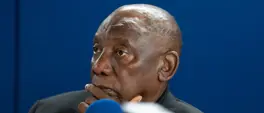US Ambassador to SA reacts to sanctions on Zimbabwean president and officials
Veronica Makhoali
5 March 2024 | 11:00United States Ambassador to South Africa Reuben Brigety said the sanctions being imposed were to hold Zimbabwe’s leadership accountable.
JOHANNESBURG - United States (US) Ambassador to South Africa Reuben Brigety says the imposed sanctions on Zimbabwe's President Emmerson Mnangagwa and other officials are not meant to punish the country's citizens.
He said instead, they are intended to hold the country's leadership accountable for undermining democracy.
ALSO READ: Zim govt says imposing sanctions on President Mnangagwa tantamount to punishing citizens
The US scrapped a 21-year-old sanctions order against Zimbabwe. However, it imposed new sanctions targeted more at Mnangagwa and his inner circle, as well as three businesses.
Brigety said the penalties were meant to target the individuals and entities that were holding the country's growth at ransom through corruption and human rights abuses.
"The purpose of sanctions surely have never been to punish all the people of Zimbabwe or the country of Zimbabwe as a whole, and again those sanctions are meant to address very specific concerns that we have with regards to President Mnangagwa and others with regard to diamond and gold smuggling as well as substantial human rights abuses, especially towards opposition members in Zimbabwe."
Brigety emphasised that poor governance and corruption in Zimbabwe are responsible for the country's economic decline, and not the US.
"The economy in Zimbabwe is the responsibility of the government of Zimbabwe. It has been experiencing tremendous pressure which is a result of the choices that the government of Zimbabwe is making.
"So the nature of the sanctions are intended to try to encourage those people that have being sanctioned to stop abusing human rights, to stop their corrupt activities which are not only harming the people of Zimbabwe but also quite frankly having an impact far beyond the borders."
Get the whole picture 💡
Take a look at the topic timeline for all related articles.

















